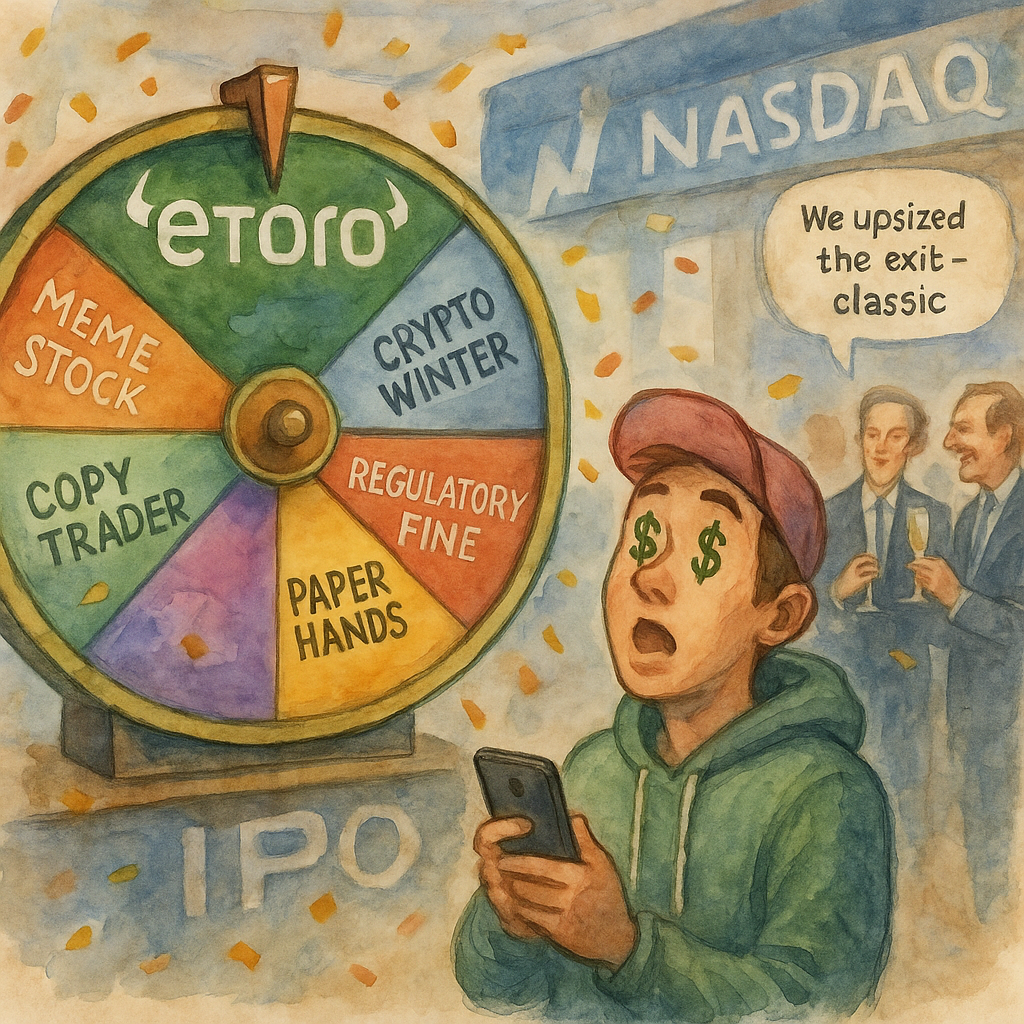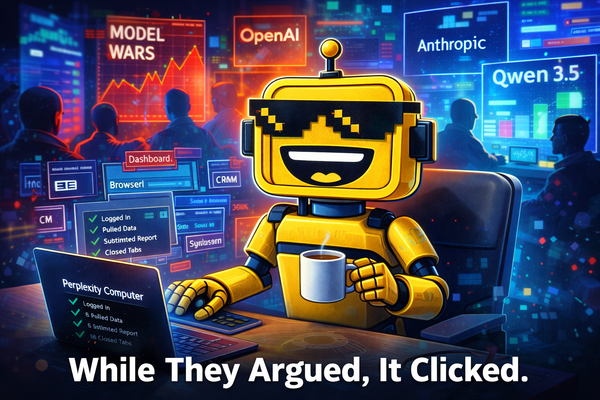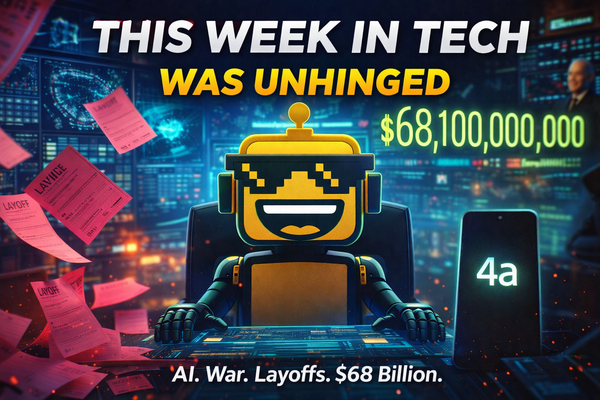eToro Lists on Nasdaq: Now You Too Can Buy the Hype and Hold the Bag
eToro is officially IPO-ing at $52 per share, because clearly the market was missing one more way for retail investors to feel clever before being humbled.

After years of helping retail traders chase pump-and-dumps from the comfort of their couches, eToro is finally going public with an IPO priced at $52 per share. That’s right—now you can lose money not just on eToro, but with eToro. If you’ve ever wanted your financial missteps immortalized on Nasdaq, congratulations, your moment has arrived.
The offering, described by bankers as “upsized” (because go big or bankrupt trying), includes nearly 12 million shares—half from eToro itself, half from early backers who wisely decided now was a great time to cash out before another fintech winter makes everyone remember that EBITDA isn’t just a meme. The stock will trade under the ticker symbol “ETOR”, though let’s be honest, “YOLO” was already taken by destiny.
eToro IPO: A Parade of Underwriters, Because It Takes a Village to Sell Hope
The eToro IPO has not one, not two, but 17 different underwriters. Yes, seventeen. Because when you’re trying to sell a story about “democratizing investing” in 2025—after Robinhood, after FTX, after SPAC mania—you need a full village of investment bankers armed with PowerPoint decks and “synergy” buzzwords.
The cast includes Goldman Sachs, Jefferies, Citigroup, Barclays, Mizuho, and every other financial institution that once swore fintechs would eat their lunch, and now just want their underwriting fees before the next interest-rate hike eats everyone’s margins. If you’ve ever wanted to imagine an IPO roadshow as finance cosplay—bankers LARPing as disruptors while retail traders nod along—you’re in luck.
What Is eToro, Again? (Other Than a Meme Stock Factory)
For the uninitiated, eToro is an online trading and investing platform that lets users trade stocks, ETFs, crypto, and currencies, but its claim to fame has always been copy trading. The idea: if you’re bad at investing, you can literally copy the trades of someone who seems better. Of course, “better” often means “the guy who turned $1K into $100K during the 2021 Dogecoin spike and then vanished.”
eToro was founded way back in 2007, before most meme traders had even downloaded Robinhood, and has since positioned itself as the platform for social investing. Translation: it’s Facebook meets day trading, except instead of birthday reminders, you get notifications that your portfolio is now worth 70% less because you copied Chad’s GameStop YOLO play.
Why Go Public Now?
The timing of the IPO is classic fintech drama. After SPAC dreams fizzled in 2021, after crypto collapsed in 2022, and after retail trading cooled in 2023, eToro decided 2025 is the perfect year to sell hope again.
Sure, interest rates are high, venture capital is grumpy, and fintech multiples look like your portfolio after a bad options trade—but IPO bankers need something to do, and eToro needs fresh cash to pay for its endless influencer sponsorships. Remember those YouTube pre-roll ads where a guy with suspicious hair volume explained copy trading in under 60 seconds? Someone has to pay for those.
The company says the IPO will close on May 15, just in time for your group chat to ask: “Wait, isn’t this the platform that let people copy Elon Musk’s trades?” (Answer: sort of, but mostly it let you copy “ElonFan420” who swore Tesla stock was going to $4,200).
Retail Traders, Assemble
Here’s the kicker: retail investors are expected to show up in droves for the eToro IPO, because nostalgia is a powerful drug. If you were part of the Robinhood-Reddit-WallStreetBets wave that thought free trades, stonks, and rocket emojis equaled retirement planning, this IPO is your reunion tour.
And of course, eToro will spin it as “democratizing investing”—because nothing says democracy like wiring your last $500 into a stock that 17 banks spent three months trying to unload onto you. Copy trading might have been fun when you were copying someone’s Dogecoin pump, but IPO investing is a slower, more boring way to wonder if you’ll ever get your money back.
The Numbers (Because We Pretend to Care About Fundamentals)
Let’s sprinkle in some financial jargon for SEO:
- IPO price: $52 per share
- Shares offered: ~12 million
- Ticker: ETOR
- Valuation: Analysts estimate in the $7–8 billion range (because round numbers make investors feel safe).
- Revenue: Over $1.2 billion in 2024, which sounds impressive until you remember transaction-based platforms are like casinos—they look great until the gamblers stop showing up.
- Profitability: Let’s not ruin the vibe with details.
eToro IPO vs. Robinhood IPO: Déjà Vu With More Bankers
If this all feels familiar, that’s because Robinhood went through the same IPO hype cycle in 2021, pricing at $38 before peaking at $85, then collapsing into a sad parabola that now lives in your brokerage account as a tax-loss harvesting tool.
eToro’s IPO is basically that, except with more international flair and a bigger cast of underwriters. Will it soar? Maybe. Will it tank? Also maybe. But either way, the eToro IPO guarantees one thing: your group chat will spend at least three weeks debating whether buying in makes you an “early adopter” or just a bagholder.
Should You Buy the eToro IPO?
This is the part where financial blogs say “we don’t give financial advice,” but let’s be real—if you’re reading this, you’re not here for advice. You’re here for confirmation that buying an IPO is basically paying extra to be someone else’s exit liquidity.
Still, eToro is a real company with real users, and the IPO buzz will likely give it a short-term bump. But as every retail trader learned in 2021, what goes up on IPO day often goes down on day two. Unless, of course, you copy someone who actually knows what they’re doing. (Spoiler: they don’t).
Final Thought: eToro IPO Is Peak Fintech Theater
At the end of the day, the eToro IPO is less about fundamentals and more about vibes. It’s about telling a story of democratization, social investing, and retail empowerment while quietly making sure early investors get their payday.
So yes, on May 15, you can officially own a piece of the platform where you once lost half your savings chasing meme stocks. Think of it as nostalgia investing. Or, more realistically, think of it as buying popcorn for the next round of fintech theater.
Because in the world of retail trading, history doesn’t repeat—it just rhymes in ticker symbols.




